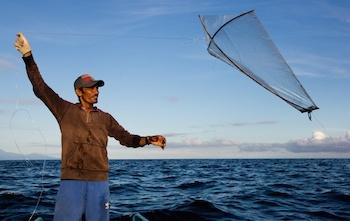
Look out Whole Foods: Safeway is pulling ahead when it comes to seafood transparency.
Whole Foods met its match when Safeway was ranked slightly ahead for seafood sustainability by Greenpeace back in 2011. Both retailers had much to celebrate when they came out with the NGO's first ever seafood rating of "good."
Safeway hasn't taken its foot off the gas pedal in recent years, though. The company has continued to push ahead toward an audacious goal of 100 percent sustainable sourcing for all fresh and frozen seafood by the end of this year. The grocer's latest commitment brings it up to par with your local farmers market when it comes to worker transparency.
Sustainable seafood awareness and availability have moved in leaps and bounds thanks to the hard work of organizations like Marine Stewardship Council, Monterey Bay Aquarium and Future of Fish. These organizations work simultaneously on consumer education and seafood supply issues to ensure that when consumers set out to make a responsible purchase, they find good product availability on the shelves. But much of that seafood advocacy work has focused on environmental issues. Social issues -- from forced labor and child labor to a lack of workplace safety precautions -- remain a huge area of concern worldwide. Which is why the latest partnership between Fair Trade USA and Safeway is so exciting.
On Tuesday, Safeway and Fair Trade USA announced a new partnership to bring Fair Trade Certified seafood to North America.
Safeway shoppers in the American Northwest (including Northern California), can now find Fair Trade certified yellowfin tuna in their grocers' freezers. The yellowfin, sold under the Natural Blue line and imported by Anova, LLC, comes from a brand new group of fishermen in the Indonesian Maluku island chain. One hundred and twenty small-scale fishermen on these islands locate and catch yellowfin using single-hook handlines attached to handmade kites. The Monterey Bay Aquarium rates yellowfin tuna caught in this manner a Good Alternative.
Now that the group is organized and can earn a premium for their product, they plan to use part of their first Fair Trade Community Development Premiums to purchase compasses to make it easier to get home in the fog.
Why organize?
While the environmental impacts of seafood are well understood, few people know the details of how unregulated fishing can harm the 200 million people who work in the seafood industry worldwide. I asked Maya Spaull, director of new category innovation at Fair Trade USA, to explain why this industry even needs Fair Trade.
She told me about slavery at sea. If you've heard stories about enslaved sex workers, this will likely sound familiar: Cambodian men are offered better paying jobs in Thailand and join a shipping vessel, only to discover that there are no jobs on land. Rather, they'll be working on an IUU (illegal, unreported, unregulated) fishing vessel for 20 hours per day, facing beatings at the hands of an armed crew. "It's truly petrifying because you are at sea," Spaull said. "If you want to escape, your choice is to jump to death or wait until the ship eventually docks and try to escape."
These IUU vessels fish in unregulated waters -- trawling and grabbing all sorts of species to sell for whatever they can get -- and represent many of the harmful fishing practices that sustainable fishery efforts are trying to eradicate.
Beyond this dire story, many fisherman and seafood workers lack access to safety equipment, tools for environmentally preferred fishing techniques and even ice to keep their catch fresh, Spaull told me. Fair Trade USA focuses on empowering fisherman to improve their situation -- righting many of the environmental wrongs along with the social ones.
This new product will help Safeway reach its 2015 goal of 100 percent responsibly-caught fresh and frozen fish. “We are pleased to add the tuna products to the other Fair Trade Certified products offered by Safeway such as O Organics coffee and pineapples from Costa Rica,” said Chris Ratto, director of sustainability at Safeway.
As for what's next, Fair Trade USA is hard at work signing up more communities to get certified in the hopes that that a broader range of Fair Trade certified seafood will become available nationwide.
Image credit: Paul Hilton
Jen Boynton is the former Editor-in-Chief of TriplePundit. She has an MBA in Sustainable Management from the Presidio Graduate School and has helped organizations including SAP, PwC and Fair Trade USA with their sustainability communications messaging. She is based in San Diego, California. When she's not at work, she volunteers as a CASA (court appointed special advocate) for children in the foster care system. She enjoys losing fights with toddlers and eating toast scraps. She lives with her family in sunny San Diego.














